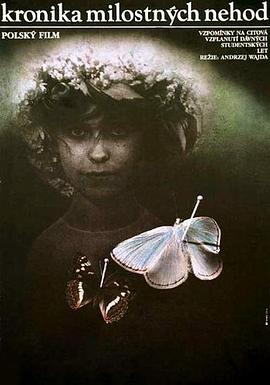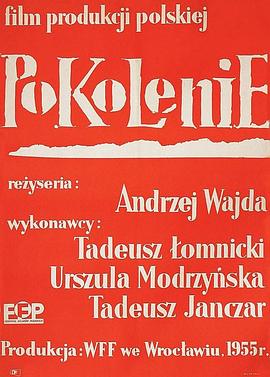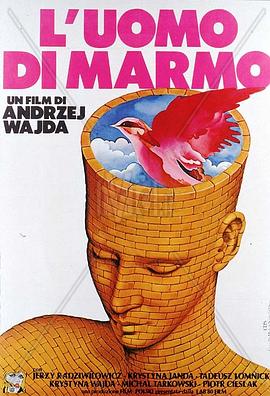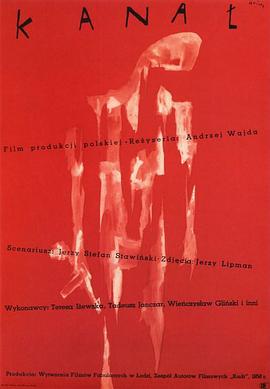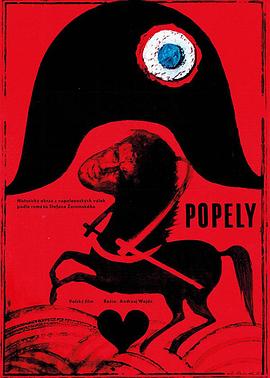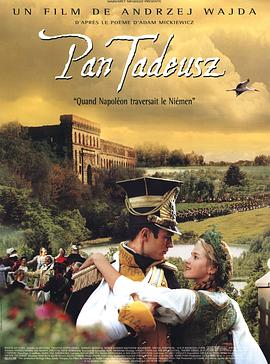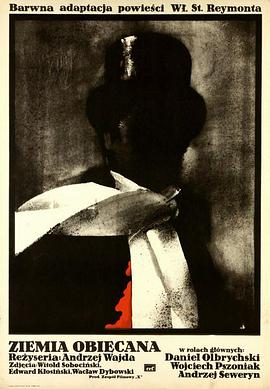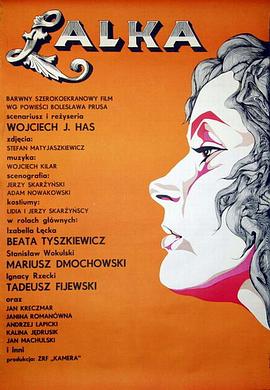塔德乌什·孔维茨基安杰伊·瓦伊达
搜索 "塔德乌什·孔维茨基安杰伊·瓦伊达" ,找到 部影视作品
导演:
主演:
剧情:
导演:
主演:
剧情:
在被德国占领的波兰,年轻一代长大了。Stach就是其中一个,他和朋友们起初只是自发地从事危险的抵抗活动,总的来说是无组织无目的。后来在一个慈祥的共产党干部的带领下,他接触到了地下组织。当看到那个勇敢美丽的青年领袖Dorota时,他就加入了进去并与Dorota坠入爱河。接着Stach就投入反抗压迫和屈辱的危险活动中,直到要对其他人的生命负责时他就变成熟了。不幸的是Dorota被逮捕,Stach悲痛欲绝。与此同时,地下抵抗组织招募了新成员,新的一代正在成长。
导演:
主演:
剧情:
影片描写刚从电影学院毕业的学生阿格涅什卡,雄心勃勃,立志拍一部以50年代劳动模范砖瓦工人布尔库特为主角的传记性记录片作为自己的毕业论文。为了弄清楚主人公是如何成为劳动模范,后来被控告判罪,而最终又恢复...
导演:
主演:
剧情:
1944年9月底,悲剧性的华沙起义已接近尾声,一支波兰“国家军”在中尉查德拉(Wienczyslaw Glinski 饰)带领下驻防一栋破败的建筑。华沙市内被德军分块切断,与家人失散的作曲家米考只好在这支30人小队中栖身。悬殊的军事差距让战士们心灰意懒,米考的钢琴声有些怪异的飘荡在废墟上空。德军的小型攻势很快让队伍无法招架,全员进入下水道转移阵地。 波兰战士们在没有饮食的下水道中茫然前行,德军不时投放毒气,有一些战士疯掉了,但更多人死在了下水道中。查德拉的队伍很快迷失了方向,战士们也分别迷失在暗无天日的下水道中…… 本片获1957年戛纳电影节评委会大奖。是导演安杰依·瓦伊达(Andrzej Wajda)战争三部曲的第二部。
导演:
剧情:
贵族少年拉法尔在一次狂欢节上,结识了年轻美貌的姑娘盖列娜,两人一见钟情,并偷偷幽会,两人的私情被家人发现,拉法尔被父亲赶出家门。几年以后,拉法尔在哥哥好友的介绍下参加了秘密组织,见到了昔日情人盖列娜,盖列娜已嫁给秘密组织领导人。尽管如此,她仍深爱着拉法尔。一天夜里,两人被强盗抓住,盖列娜为保全自己,跳下深渊,拉法尔得救后被误认为是强盗,关押了很久后被放出,对生活失去了信心,后来拉法尔在好友的帮助下重新振作起来,并参加了波兰军团。 本片根据波兰著名批判现实主义作家热罗姆斯基(Stefan Zeromski )的同名长篇小说改编,获戛纳电影节金棕榈提名。瓦依达在这个题材中所表现出的兴趣所在是十分明显的:他试图追索波兰民族意识的形成过程。此片引起了波兰知识界的热烈评论,许多人文科学界的权威和一些著名作家都发表了自己的看法,再此之前,几乎从来没有一部电影可使...
导演:
主演:
剧情:
19世纪初,波兰-立陶宛帝国遭到俄罗斯、普鲁士和奥地利的入侵,帝国犹如大厦将倾,岌岌可危。正在危急时刻,一部分波兰人将希望寄托在拿破仑的身上。他们与拿破仑达成协议,法军帮助波兰人拯救家园,作为回报,波兰人将协助法国人攻打俄罗斯。 在波兰的乡间有两个对立的显赫贵族,他们的仇恨从18世纪末便已延续。霍里斯兹克家族支持独立,亲善法国;苏普里卡则对俄国向存好感。两个家族的矛盾在国破家亡之际更加激烈,而苏普里卡家的塔杜斯(Michal Zebrowski 饰)却在这个时刻爱上了对方的女子…… 本片根据立陶宛(波兰)诗人Adam Mickiewicz的长篇叙事诗《Pan Tadeusz》改编,并荣获2000年波兰电影奖最佳女演员、最佳摄影、最佳剪辑等六项奖。
导演:
主演:
剧情:
讲述卡罗尔、莫里斯和马科斯三个好朋友办工厂梦的过程,真实冷静的展示了波兰资本主义初期残酷的社会画卷。
导演:
主演:
剧情:
文卡尔是华沙电视台的编导,由于格丹斯克造船厂正在爆发激烈的罢工事件,因此电视台派他前去采访。当文卡尔乘车来到事发地,却发现已有司机接站,并且后续的接待都很周到。但是,当他见到傲慢的政府官员巴迪后,才发现自己成了资方与当局勾结的牺牲品。后者企图通过媒体混淆视听。而文卡尔的任务是冒充劳方的同情者,混入罢工委员会。违心做了卧底的文卡尔,深入接触了罢工运动领导者托姆楚克,并在调查中发现了其父劳动模范比尔库克的死亡悬案。此外,文卡尔还遇到了并肩作战的情侣,丧父而坚持信仰的旗手,甚至还有临时起意的叛徒,在复杂的心理搏杀中,他的良知与专业精神,使他逐渐对劳方产生了怜悯与同情,然而事情远比预想复杂得多……本片获第34届戛纳电影节最佳影片金棕榈奖。
导演:
主演:
剧情:
弗拉迪斯瓦夫·斯特泽敏斯基(W?adys?aw Strzemiński)原是备受爱戴的大学教授与知名的前卫派画家。当斯大林提出“社会主义式的写实主义”,且被波兰当局奉为圭臬,要求上行下效时,他站在异议的那方,结果不但被撤销教职、剥夺艺术家身份,甚至连餬口饭吃的生存权也尽遭践踏。而自诩为小螺丝钉的人们,成了国家机器的暴力帮凶。
导演:
主演:
剧情:
The Doll is an adaptation of the novel, The Doll (novel) by Bolesław Prus, which is regarded by many as one of the finest Polish novels ever written and, along with Pharaoh (novel), made Bolesław Prus a potential candidate for the Nobel Prize in literature. The influence of Émile Zola is evident, and some have compared the novel to Madame Bovary by Gustave Flaubert; both were Prus's contemporaries. The movie, however, may be more compared to Stendhal's Le Rouge et le Noir, (The Red and the Black). The Doll constitutes a panorama of life in Warsaw between 1878 and 1879, and at the same time is a subtle story of three generations of Polish idealists, their psychological complications, their involvement in the history of the nineteenth century, social dramas, moral problems and the experience of tragic existence. At the same time this story describes the disintegration of social relationships and the growing separation of a society whose aristocratic elite spreads the models of vanity and idleness. In the bad air of a backward country, anti-Semitic ideas are born, valuable individuals meet obstacles on their way, and scoundrels are successful. This poetic love story follows a nouveau riche merchant, Stanislaw Wokulski, through a series of trials and tribulations occasioned by his obsessive passion for an aristocratic beauty, Izabela Lecka, played by the famous Polish actress, Beata Tyszkiewicz. Plot As a descendant of an impoverished Polish noble family, young Wokulski is forced to work as a waiter at Hopfer's, a Warsaw restaurant, while dreaming of a life in science. After taking part in the failed 1863 Uprising against Tsarist Russia, he is sentenced to exile in Siberia. On eventual return to Warsaw, he becomes a salesman at Mincel's haberdashery. Marrying the late owner's widow (who eventually dies), he comes into money and uses it to set up a partnership with a Russian merchant he had met while in exile. The two merchants go to Bulgaria during the Russo-Turkish War of 1877-78, and Wokulski makes a fortune supplying the Russian Army. The enterprising Wokulski now proves a romantic at heart, falling in love with Izabela, daughter of the vacuous, bankrupt aristocrat, Tomasz Łęcki. In his quest to win Izabela, Wokulski begins frequenting theatres and aristocratic salons; and to help her financially distressed father, founds a company and sets the aristocrats up as shareholders in his business.The indolence of these aristocrats, who secure with their pensions, are too lazy to undertake new business risks, frustrates Wokulski. His ability to make money is respected but his lack of family and social rank is condescended to. Because of his help (in secret) to Izabela's impecunious but influential father, the girl becomes aware of his affection. In the end she consents to accept him, but without true devotion or love.(wikipedia)

